Dear WesleyNexus Colleague:
On April 14, 2018, Casey Church gave a talk to a group of suburban United Methodists at Covenant United Methodist Church. Covenant is a moderate sized congregation centered in Gaithersburg, Maryland, in one of the most affluent counties in America. In contrast, Casey Church is a Native American from the Pokagon Band Potawatomi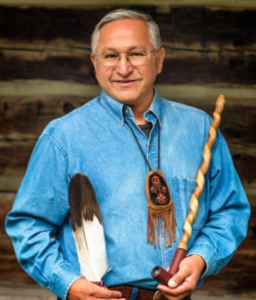 Indian from southwest Lower Michigan who has answered a personal call to be a missionary to the Native American communities in the United States. Though a United Methodist, Casey is not an ordained clergyperson. With a background in anthropology and a commitment to the Gospel, he has committed himself to making the message meaningful within the cultural context of his target communities. He terms his approach contextual missiology where the core of the Gospel is joined with the ritual practices and cultural narratives passed down to the Native American through the centuries. Emphasizing John Wesley’s understanding of prevenient grace, Church presented a forceful and convincing case for cultural awareness when sharing the central message of Christianity. You can find Casey’s story told in his own words here.
Indian from southwest Lower Michigan who has answered a personal call to be a missionary to the Native American communities in the United States. Though a United Methodist, Casey is not an ordained clergyperson. With a background in anthropology and a commitment to the Gospel, he has committed himself to making the message meaningful within the cultural context of his target communities. He terms his approach contextual missiology where the core of the Gospel is joined with the ritual practices and cultural narratives passed down to the Native American through the centuries. Emphasizing John Wesley’s understanding of prevenient grace, Church presented a forceful and convincing case for cultural awareness when sharing the central message of Christianity. You can find Casey’s story told in his own words here.
Cultural context and the need for contextual missiology holds true for all of us. Since one of the cornerstones of our time is science and its technological offspring, faithful evangelism must take it into account and craft a message appropriate to this context. This cultural context has changed profoundly over the past 300 years since John Wesley preached his Gospel of grace. Time and space are no longer absolutes. We hear echoes of the universe’s beginning in the ubiquitous background radiation. Mind has become correlated with material structural processes in the brain while material weirdness found in the quantum world forces questions concerning matter and mind interaction. It can be very disorienting and disturbing, particularly when it affects one’s faith. Changes in our understanding of gender and sexuality have been particularly difficult for those in the Wesleyan tradition. The United Methodist Church in particular is in the middle of addressing these changes with decisions that will determine the shape of Methodism for years to come.
This month WesleyNexus highlights recent articles in the Baltimore-Washington Annual Conference newspaper, the UMConnection, as the denomination grapples with these issues. The first article describes the Commission on a Way Forward. This 32-member commission was formed to “do a complete examination and possible revision of every paragraph of the Book of Discipline concerning human sexuality and explore options that help to maintain and strengthen the unity of the church”. The fruits of their efforts are complete and will be presented to the Council of Bishops in May this year and will be presented to a special General Conference in 2019.
The second article reports on the recent decision of the Baltimore-Washington Conference Board of Ordained Ministry’s decision to no longer “consider or evaluate sexual orientation or gender identity, nor see them to be sufficient reasons to deny a candidate’s ability to live up to our United Methodist standards”.
Additional articles provide important background information relevant to this subject. The first provides a background history of the change in the Diagnostic and Statistical Manual (DSM) removing homosexuality as a psychiatric pathology. Written by a psychiatrist who participated in the recent DSM-5 Workgroup on Sexual and Gender Identity Disorders, this article provides important information on that momentous change. The next article addresses implicit bias, a topic that was outlined in our special WesleyNexus February event two years ago by Rev. Amy Stapleton, staff member of the General Commission On Religion and Race of the UMC. Finally, the last article introduces the term intersectionality, a term that has been floating around for a few years to refer to patterns of dominance and oppression present in our society.
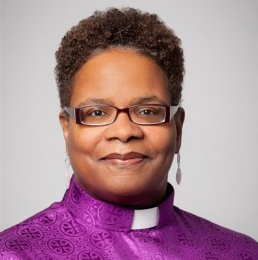
While these are not the usual topics we have presented over the past years, given the current crisis within the church, we at WesleyNexus feel we cannot look the other way and play it safe. As we have always stated, we value diversity and engagement and it is hoped that we can stay united in spite of our differences. As Bishop LaTrelle Easterling has stated, “it is not unfaithful, nor an abdication of our responsibility as disciples of Jesus Christ, to remain united within our diversity. We have done just that since the beginning of our denomination. The only times we have failed to do so is when we split over the issue of slavery, and segregated ourselves over the issue of race”.
We appreciate the contributions we have received throughout 2017. We used most of our funds presenting our Evolution Weekend program on February 11, making it available as a live video feed and recording it so those unable to attend can view it at their leisure. Looking forward, we will continue to develop programs throughout 2018. We will need your support and hope you will consider helping us out. WesleyNexus is a 501(c)(3) charitable, educational organization, and we will acknowledge all gifts from individuals for tax reporting purposes.
Thanks in advance for your support.
God Bless,
Rick, Maynard, and the rest of the
WesleyNexus Board of Directors
*********************************
UMC seeks way forward by Erik Alsgaard
In this article, Erick Alsgaard, Managing Editor of the Baltimore-Washington Annual Conference (BWCUMC) UMConnection, provides a clear summary of the events that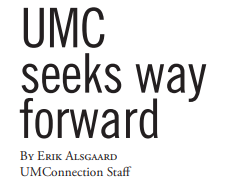 have led to the Commission on the Way Forward and the two models that will comprise a report that will be the subject of the Council of Bishops meeting the end of May. It also describes actions being taken by the BWCUMC over the coming year to prepare for the upcoming special General Conference in 2019. The article can be found on the first page of the April, 2018 UMConnection here.
have led to the Commission on the Way Forward and the two models that will comprise a report that will be the subject of the Council of Bishops meeting the end of May. It also describes actions being taken by the BWCUMC over the coming year to prepare for the upcoming special General Conference in 2019. The article can be found on the first page of the April, 2018 UMConnection here.
*********************************
BOOM revises policy that addresses homosexuality by Melissa Lauber
The Board of Ordained Ministry (BOOM) is the institutional arm of the United Methodist Church charged with “primary responsibility for the enlistment and recruitment of candidates for ordained and licensed ministry” (¶635.2a) and recommends individuals for approval to ordained ministry. The Baltimore-Washington Annual Conference has found itself in the middle of the homosexuality controversy for many years and was tasked in 2017 to review the board’s policies and practices around LGBTQ candidates, in light of the Commission on a Way Forward. In early April, the Baltimore-Washington BOOM made the unprecedented decision to challenge the United Methodist Book of Discipline by explicitly stating that sexual orientation will not be considered when evaluating a candidate for ordained ministry. The article can be found here on page 4 of the UMConnection.
*********************************
Out of DSM: Depathologizing Homosexuality by Jack Drescher
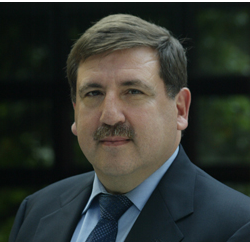
The Diagnostic and Statistical Manual of Mental Disorders (DSM), now in it’s fifth edition, provides a classification of mental disorders that is used by mental health professionals to communicate patient diagnoses to interested parties such as hospitals, clinics and insurance companies. Prior to 1973, homosexuality was considered a mental disorder but in 1973, it was removed from the DSM-II. In this “Behavioral Science” article of 2015, Dr. Jack Drescher describes the history of that change. He describes his article in the following abstract:
“In 1973, the American Psychiatric Association (APA) removed the diagnosis of “homosexuality” from the second edition of its Diagnostic and Statistical Manual (DSM). This resulted after comparing competing theories, those that pathologized homosexuality and those that viewed it as normal. In an effort to explain how that decision came about, this paper reviews some historical scientific theories and arguments that first led to the placement of homosexuality in DSM-I and DSM-II as well as alternative theories that eventually led to its removal from DSM III and subsequent editions of the manual. The paper concludes with a discussion of the sociocultural aftermath of that 1973 decision”. The complete article can be found here.
*********************************
How to Think about “Implicit Bias” by Keith Payne, Laura Niemi and John M. Doris
Like water to a fish, we all have implicit biases. Unless we are mindful and self-reflective, these biases will remain hidden and unnoticed, covered up by our presumptions of normality. But as these authors point out, being unnoticed does not mean they do not exist and that they are not harmful. As they conclude in their article, “one reason people on both the right and the left are skeptical of implicit bias might be pretty simple: it isn’t nice to think we aren’t very nice. It would be comforting to conclude, when we don’t consciously entertain impure intentions, that all of our intentions are pure. Unfortunately, we can’t conclude that: many of us are more biased than we realize. And that is an important cause of injustice—whether you know it or not”. Read the article here.
*********************************
Intersectionality for Bewildered White Evangelicals by Morgan Guyton
In this 2016 article, Morgan Guyton, co-director of the NOLA Wesley Foundation, the United Methodist campus ministry at Tulane and Loyola University in New Orleans,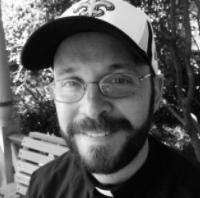 addresses the concept of intersectionality, a concept that may be unfamiliar to many WesleyNexus readers. Intersectionality, as defined by Webster, refers to “the complex, cumulative way in which the effects of multiple forms of discrimination (such as racism, sexism, and classism) combine, overlap, or intersect especially in the experiences of marginalized individuals or groups”. He takes an historical perspective, addressing Christian power structures and patterns but also ended by saying “The white evangelical church is in desperate need of introspection as we face the disaster of the next four years. What kind of humanity does God want to create among us? Does God want to “make America great again” by restoring the hierarchical order in which white men are the authority figures they have been for the past five hundred years of colonial Christianity? Or does God want a humanity in which every person’s dignity is treasured in its irreplaceable uniqueness? Order is a lot easier on those who put themselves in charge than dignity is; all they have to do to be “holy” is to police others”. The dynamic playing out in national politics seems to be playing out in microcosm in the United Methodist Church. Can we be united through dignity or divided by power? We shall see. You can read the article here.
addresses the concept of intersectionality, a concept that may be unfamiliar to many WesleyNexus readers. Intersectionality, as defined by Webster, refers to “the complex, cumulative way in which the effects of multiple forms of discrimination (such as racism, sexism, and classism) combine, overlap, or intersect especially in the experiences of marginalized individuals or groups”. He takes an historical perspective, addressing Christian power structures and patterns but also ended by saying “The white evangelical church is in desperate need of introspection as we face the disaster of the next four years. What kind of humanity does God want to create among us? Does God want to “make America great again” by restoring the hierarchical order in which white men are the authority figures they have been for the past five hundred years of colonial Christianity? Or does God want a humanity in which every person’s dignity is treasured in its irreplaceable uniqueness? Order is a lot easier on those who put themselves in charge than dignity is; all they have to do to be “holy” is to police others”. The dynamic playing out in national politics seems to be playing out in microcosm in the United Methodist Church. Can we be united through dignity or divided by power? We shall see. You can read the article here.
*********************************
Reminders:
“Artificial Intelligence Turns Deep: Who’s in Control?”

64TH ANNUAL IRAS SUMMER CONFERENCE ON STAR ISLAND
(JUNE 23-30, 2018) WESLEYNEXUS participants qualify for a 30% discount. Please take this opportunity seriously.
I’m sorry Dave, I’m afraid I can’t do that…”
said HAL in the most famous line in 2001: A Space Odyssey.
From the IRAS website:
From early myths of artificially created beings to today, the question “who’s in control” has troubled us. The future of AI is likely to have powerful consequences related to jobs, income distribution, social justice and our polity in general. On the 50th anniversary of 2001, IRAS returns to consider the prospects, opportunities and dangers of Artificial Intelligence. If we succeed in creating science fiction’s “conscious” machine, what would be our duties to it (as well as its duties to us)? How will humans identify and find meaning in life as the breadth of skills unique to living, sentient beings shrinks? Join us, as we consider both how AI will shape the future of humanity, and how we can insure that AI benefits society.
IRAS cultivates a community of informed and respectful inquiry and dialogue at the intersections of science with religion, spirituality and philosophy in service of global, societal and personal well-being. Star Island provides an environment that frees all who come to renew spiritually, explore matters of consequence, and gain knowledge about the world as it might ideally be. Participants in the WesleyNexus network will qualify for a 30% discount on registration, room and board at Star Island, so this makes the conference an attractive option for you who receive this newsletter. We urge everyone to take seriously this dialogue opportunity.
For more information and to register: http://www.iras.org/2018-summer-conference.html
*********************************
Annual Cosmos and Creation Conference at Loyola University in Maryland
Friday June 8, through Sunday, June 10, 2018.
Loyola University Maryland | 4501 N. Charles Street, Baltimore, MD 21210
The 36th Annual Cosmos & Creation Conference will be held Friday June 8, through Sunday, June 10, 2018. The keynote speaker will be Michelle Francl, Bryn Mawr College, Adjunct Scholar at the Vatican Observatory. The topic of her presentations will be: Are scientists mystics?
For more information and registration, go to: https://www.loyola.edu/join-us/cosmos-creation.
*********************************
The Inside Story: Consciousness, Nature, Transcendence
A transdisciplinary conference on Mind, Matter, Meaning and Mysticism
November 9-10, 2018
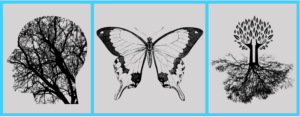
Sponsored by Villanova University, Department of Theology & Religious Studies, Connelly Chair in Christian Theology, the Augustinian Institute, Department of Philosophy, and Halloran Philanthropies.
Descartes’ famous dictum—I think, therefore I am—gave rise to the modern distinction between mind and matter. But “the inside story” is more complex and thrilling—possibly uniting mind and matter, meaning and mysticism.
Join the in-depth exploration of consciousness, nature, and transcendence, as scientists, philosophers, and theologians ask “What’s on the inside?” Keynote speakers include Philip Clayton, WesleyNexus Advisory Board Member and author of numerous books related to science and religion, including The Predicament of Belief and Mind and Emergence, Ilia Delio, a long time friend of WesleyNexus, past member of the Washington Theological Consortium Science and Religion Study group and author of Christ in Evolution, and Terrence Deacon, American Neuroanthropologist, Professor of Biological Anthropology at the University of California, Berkeley and author of Incomplete Nature: How Mind Emerged from Matter.
More information on the program can be found here:
https://www1.villanova.edu/villanova/artsci/theology/news_events/inside-story-conference/about.html
*********************************
WesleyNexus presented three workshops for BWCUMC
During the last sixty days, WesleyNexus initiated and presented three workshops during the spring regional sessions in the Baltimore-Washington Annual Conference called Leadership Days. These all-day events are structured with two districts collaborating, so that some 150-plus leaders (lay and clergy) from the cooperating districts focus on Conference and congregational priorities. These events have a long history within the Conference, as is the case in some other Annual Conferences in the jurisdiction.
For the Central Maryland/Greater Washington region we sponsored a workshop led by former WesleyNexus Board member, Dr. Seymour Garte, called Faith meets Science: New Ideas in Evolutionary Biology. The neo-Darwinian modern synthesis (NDMS) has been the bedrock of evolutionary theory for many decades. But the NDMS has proven limited and out of date with respect to several areas of biological research. A new extended evolutionary synthesis (EES), which takes into account more complex interactions between genomes, the cell and the environment, and allows for a reexamination of many of the assumptions of the NDMS. To the standard paradigm of slow accumulation of random point mutations as the major mechanism of biological variation must now be added many new mechanisms, that call into question the random, purposeless nature of evolution. Biochemical evidence for the teleological origin of evolution, and observations of convergence in biology, require new ways of thinking about the science, as well as the philosophical/theological meaning of life. There are strong implications for Christian faith in this opening of evolutionary theory to a broader and more exciting view of Darwin’s great theory.
For the Western Region event, we presented the work of J. D. Stillwater, a teacher in Harrisburg, Pennsylvania, called One Song: The Science of Unity. This workshop focused on what scientific knowledge has to say about unity, connection, faith, and oneness. In the last 150 years, lines of division between traditional fields of scientific study have dissolved into a single overlapping worldview some call The Great Story. That big-picture knowledge-base offers vast landscapes ripe with profound religious and spiritual meaning, equaling or surpassing traditional sources of wonder, mystery, connection, and grace. It also tempts us to conclude, wrongly, that we are hopelessly outdated within our tradition. The search for a coherent approach to challenges is greatly impeded by culture wars, themselves exacerbated by theological divisions that appear to pit science and reason against the human experience of the sacred, profound, and mysterious. A common nature-based “story” from science, a shared language that informs all religious traditions and threatens none of them, allows for a more integrated approach to faith, science & reason.
For the Greater Baltimore districts, we sponsored our own Board member, Jennifer Secki Shields who presented a workshop called Bringing the Faith-Science Dialogue into Sunday Morning Programming. Studies show that: 1) many young Christians have come to the conclusion that faith and science are incompatible; 2) one of the top reasons young people are leaving the church today is the perception that the church is anti-science; and 3) young people in schools worldwide have the perception of conflict between science and religious faith by the age of 11. But, what appears to be an obstacle or challenge for the local church today–interfacing with a culture increasingly shaped by science–can be an opportunity for new expressions of discipleship, worship, and evangelistic outreach. Christ Crossman UMC (located in Falls Church, Virginia, just outside of Washington, D.C.) has seen the fruits of intentionally facilitating the faith-science dialogue for every age in the congregation. Specifically, it has incorporated hands-on science in its children’s lessons; explored science-and-religion issues in its confirmation classes; and hosted the faith-science dialogue in its worship services. The positive impacts have been seen in feedback from parents and congregants and in increased attendance. This case study suggests that bringing the topics of science into Sunday morning church programming not only makes for more robust discipleship for all ages but also can be an innovative means for witness, evangelism, and community outreach. The discussion that ensued was vigorous and enthusiastic about implementing some of these ideas.
